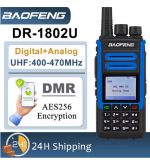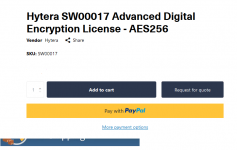Razorback55
Member
- Joined
- Mar 6, 2025
- Messages
- 30
- Reaction score
- 10
Hello,
I wonder about the Wassenaar Arrangement of which the U.S. is a party, as well as Europe, Australia, India and even Russia.
ChatGPT tells me that walkie-talkies are indeed subject to the Wassenaar Arrangement if they use strong cryptography.
Part 5b of the Arrangement requires an export permit to be obtained for any foreign buyer if the encryption keys are longer than 56 bits.
See page 7:
It can be seen that this Arrangement is well in force, in particular with the European TETRA standard.
I won't go into detail here but the researchers have demonstrated that the TEA1 for commercial applications with an 80-bit key actually has a key of only 32 bits and the TEA7 which is a commercial encryption also given with 192-bit keys, actually has 56-bit keys (the maximum allowed by the Wassenaar Arrangement)
So we know that the Wassenaar Arrangement is still active.
All the Motorola, Hytera or even Chinese radios that offer AES256 bits (and are therefore banned from export) are nevertheless exported without problem throughout the planet.
Since no buyer has to get an import license (not on Aliexpress, Amazon or anything else), what can make you believe that AES256-bit is reliable?
Wouldn't there be a backdoor like in Tetra? maybe not on the AES256 algorithm but elsewhere in the protocol (bits of the key transmitted on air, master code transmitted on air to get the key...)
I wonder about the Wassenaar Arrangement of which the U.S. is a party, as well as Europe, Australia, India and even Russia.
ChatGPT tells me that walkie-talkies are indeed subject to the Wassenaar Arrangement if they use strong cryptography.
Part 5b of the Arrangement requires an export permit to be obtained for any foreign buyer if the encryption keys are longer than 56 bits.
See page 7:
It can be seen that this Arrangement is well in force, in particular with the European TETRA standard.
I won't go into detail here but the researchers have demonstrated that the TEA1 for commercial applications with an 80-bit key actually has a key of only 32 bits and the TEA7 which is a commercial encryption also given with 192-bit keys, actually has 56-bit keys (the maximum allowed by the Wassenaar Arrangement)
The new algorithms TEA5 and TEA6 use 192 bit keys without any reduction but are also restricted in where they can be deployed. The new algorithm TEA7 has an effective key length reduction to 56 bits and will be available in many countries as per the Wassenaar Arrangement.
So we know that the Wassenaar Arrangement is still active.
All the Motorola, Hytera or even Chinese radios that offer AES256 bits (and are therefore banned from export) are nevertheless exported without problem throughout the planet.
Since no buyer has to get an import license (not on Aliexpress, Amazon or anything else), what can make you believe that AES256-bit is reliable?
Wouldn't there be a backdoor like in Tetra? maybe not on the AES256 algorithm but elsewhere in the protocol (bits of the key transmitted on air, master code transmitted on air to get the key...)







